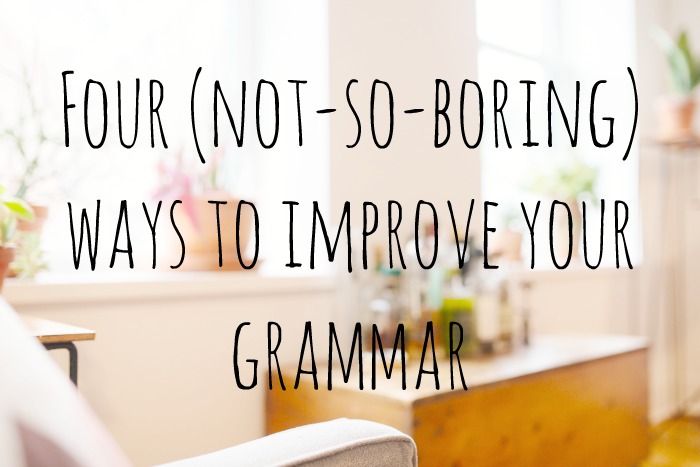I was tempted to begin this blog post with a truly outrageous statement. I considered, for example, telling you about how I bit into a piece of glass the other night or that I just bought a plane ticket to watch a friend get married on skis—oh, Canada! (Both true, and yes, I’m okay!) Because grammar isn’t exactly the most riveting subject on the planet. Most readers—and writers—are not particularly interested in talking about it, let alone working to get better at it.
But you know as well as I do that grammar matters. It doesn’t have to be perfect, no. But if we want to be taken seriously by smart and discerning people, we need to adhere to certain rules and guidelines.
Learning said rules and guidelines, however, can be borrrring. I know. I’d love to help you do it without falling asleep or bursting into tears out of frustration. You would too? Perfecto.
1. Read, all the time
Let’s start with the easiest way to improve your grammar. The slow way, which also happens to be the best way (in my opinion).
Read. Read more. Read all the time.
Despite having degrees in English and journalism, I have never officially studied grammar. We studied style in journalism school (if you aren’t sure what that means, style involves choosing between “two” or “2,” and “percent” or “per cent” or “%” and other choices about spelling and the like) and of course I was docked marks for grammar mistakes through my education. But never was I forced to stare at a grammar textbook for hours, thank goodness.
Most of what I know to be right or wrong comes from years and years of reading. I’ve read like it’s my job since childhood—until it literally became my job. As a result, for a long time I didn’t even know the language to describe grammar and syntax errors I encountered professionally: I just knew instinctively when something was wrong, and how to fix it.
I mentioned that this is the slow route. Becoming a dedicated reader will over time make you a better writer, full stop. And it will help you recognize, almost on a gut level, when a sentence is missing a subject, or when someone’s modified the wrong noun. You won’t necessarily know that that’s what’s happening, but you’ll know it’s wrong and how to fix it. No pain required.
2. Take a practical grammar course
If grammar is something you truly struggle with—or you suspect you might—it definitely wouldn’t hurt to take a short grammar course. Self-confidence is key to self-publishing: it can be hard to move forward without knowing you’re doing things “right”—or, at least, mostly right. If you tend towards confusing sentences and, er, interesting punctuation choices, consider taking a short grammar course. You’ll probably learn that you’re doing many things just fine and that there are a few simple improvements to make.
Here’s a Media Bistro course starting next week that caught my eye. I haven’t taken it myself, but it looks like a digestible and relevant overview of the essentials. Plus, the instructor has serious experience via Rolling Stone and other publications.

3. Copy other writers
I know what you’re thinking: plagiarism whaaaaat? Please don’t plagiarize. It’s scuzzy and can get you in a lot of trouble.
Here’s what I do recommend. If you’d like to work on strengthening your sentence structure but can’t stand the idea of taking an entire course on grammar (which, honestly, I would understand), try the following exercise.
Find a writer who does an excellent job of writing clear, declarative sentences in the active voice. Anything by Ernest Hemingway is a great choice (and as a side note, there’s also a nifty Hemingway app you might want to check out). You could also try George Orwell or maybe some early Margaret Atwood—any genre or subject matter will do as long as the writing is simple and strong.
Get a lined notebook, open to a passage from this writer, and copy their sentences, word for word. Spend 10 minutes doing this before you turn to your own writing. Move right into your own work while these powerful sentences are fresh in your mind.
The idea here isn’t to train yourself to write exactly like someone else, but rather to steep yourself in strong, clear writing, reminding your brain how sentences ought to be. Your own personal style will mingle with that of your writer of choice, ensuring it still sounds like YOU, and the outcome over time will be stronger writing with fewer syntax issues.
Again, you don’t have to learn the “rules” directly to write well. Writing is kind of like digestion: what goes in is what comes out (ew, sorry). If you’re reading a lot of junk, your writing will be…well, not as good as it could be, let’s put it that way.

4. Seek feedback from an editor or coach
If you work for yourself and publish your writing on your own website or blog, you won’t necessarily get the chance to work with a good editor unless you seek him or her out. But I’m not going to tell you that every blogging business owner should hire an editor, because for most of us I don’t think that’s necessary or particularly sustainable.
That said, it’s a great idea to get feedback and suggested edits from time to time, whether you work with a writing coach (um, hi!) or submit your writing to websites that follow a traditional editing process.
Here’s the important thing: if you have the opportunity to get something edited professionally, don’t just accept the changes and continue full steam ahead. Take a little extra time to ensure you understand the edits—it’s the only way to make yourself a more self-sufficient writer in the long term.
A good, kind editor will help you do this, but I don’t think it happens as much these days—what with our instantaneous publishing patterns, plethora of online publications and long long distance editor-writer relationships.
I remember the city editor at the Toronto Star, Graham Parley, reading a feature I’d written that was due to be published in a few days. I was on staff at the paper at the time and sitting on the other side of his desk when he said, “Ah, here’s one that always used to get me, too. ‘Try and find a solution’ should be ‘try to find a solution.'” Without him pointing the mistake out, I never would have known.
That level of attention, I see now, is a precious thing. We don’t typically get it when we’re self-publishing, unless we hire an editor to help us, and even then, they might just correct our mistakes without explaining them. We might not even get this feedback while getting our work published on (dynamic, new) websites, if the publication doesn’t make quality editing a priority (and many don’t). When you are lucky enough to get detailed feedback, pay attention. Write it down somewhere. Try to review it before you write or publish your next piece.
[Tweet “Remember that what goes in is what comes out—and other not-so-boring ways to improve your grammar.”]
My (entirely pragmatic) perspective
I’m not a grammar snob. I’m really not. I think it’s okay to make some mistakes and even take a few shortcuts from time to time. But, and I’m sure this is obvious, I LOVE clear, strong, effective writing. There’s nothing more powerful than being instantly understood by complete strangers (!!) because of something you’ve written. Writing, and grammar, syntax and style play a significant role in making this possible. They’re tools in the hard work that happens off-stage and, once the curtain goes up, allows the magic to unfold in a seamless way.
We all make mistakes (including me). Readers understand this, and are usually kind. But you do need to give yourself the opportunity to be taken seriously. You want to show your readers and prospective clients that you’re a knowledgeable person worthy of their respect. Good grammar won’t do all the heavy lifting for you, but it certainly doesn’t hurt.

Nicole, thank you for another great post.
I read a lot as a child (and still do!) and have this to thank for feeling fairly comfortable with grammar, although I know my skills could probably do with a brush-up.
I have something to add to your first point. When you read, if possible, read books published by established publishing houses. They are more likely to have been professionally proof-read and have gone through more checks than blogs. Online versions of broadsheet newspapers are good too.
And read stuff you enjoy of course!
Such a good point, Claire—and probably something I take for granted. Self-published books and many blogs don’t necessarily adhere to the same standards we would like to!
And yes, read what you love, always!
Thanks for taking the time to comment. xo
Your first point particularly resonated with me. Long before I was writing and editing on a professional level, I had a gut feeling for when something wasn’t right and needed to be fixed. And that came from years of reading. Such a good point! Life gets so hectic but this is yet another reason to make the time to read no matter what. And it’s never too late to make it a priority. Thanks for the great post!
Absolutely…and to be honest, I find I’m so much happier when I’m in the middle of a good book. So, yes, it’s just another reason! Thanks for taking the time to comment!
I love the point you make that if we want smart, educated people to listen to us, we need to use correct grammar. Great tips! My favorite is encouraging people to read more. I think this is one of the best ways to improve and keep learning!
Thanks Lindsey!
thanks so much, nicole!